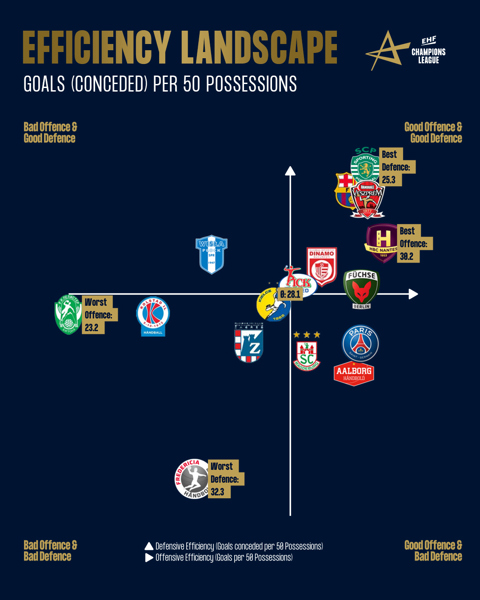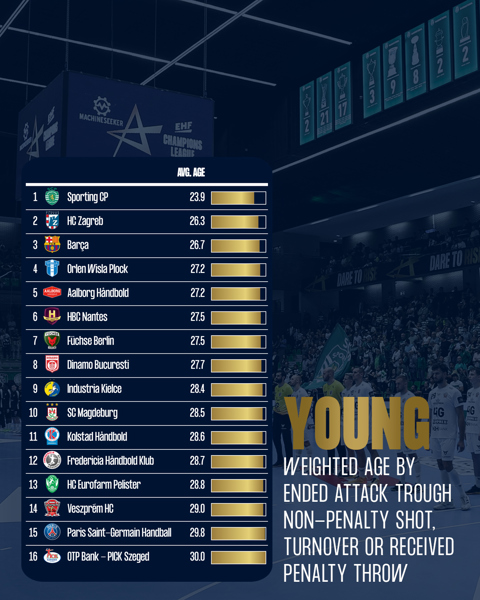Even though they lost their first game of the season against Dinamo Bucuresti last week, Sporting CP are the big surprise of the new Machineseeker EHF Champions League season. With their fresh and dynamic style of play, they were quickly able to adapt and leave their mark on their first season in the highest European competition since 2019/20.
Sporting’s games don’t just seem fresh and dynamic, the numbers also back it up. Overall, their games were at the third-highest pace with 55.3 possessions per game. Their attack ranks third as well with 28.8 goals per 50 possessions. Just HBC Nantes (30.2) and Veszprém HC (29.9) are slightly better. Their field shooting percentage is second-best with 69.1. However, the other attack figures show neither clear strengths nor weaknesses. Instead, they are good everywhere, but not outstanding.
Using statistics that are adjusted for possessions played is significantly more meaningful than just the raw number of goals (conceded) because it makes the teams actually comparable since the raw number of goals is not only influenced by efficiency, but also by the number of possessions (whether a team and their opponents play rather fast or slow). Since a game has roughly 50 possessions on average (56.8 this season), the values here are calculated on 50 possessions so that they roughly reflect those of a game.
Both goals scored and goals conceded per 50 possessions are shown in the following chart. The further to the right a team is, the better it is in attack as it has scored more goals per 50 possessions. The higher up a team is, the better it is in defence, as it has conceded fewer goals per 50 possessions.

Does defence win championships?
As the chart shows, Sporting are even better in defence than in attack, and currently have the best defence in the competition with just 25.3 goals conceded per 50 possessions. They allow the third-lowest overall shooting percentage and field shooting percentage (61.3 and 60.6), force the second-most turnovers (10.4 per 50 possessions), block the third-most shots (4.5 per cent of their opponent’s non-penalty attempts) and allow the fewest offensive rebounds by their opponents (after 10.4 per cent of their opponent’s missed shots).
At 30.6 seconds per possession, the average attacking time of their opponents is the fourth-lowest. That’s unusual, as short opponent possessions are usually a sign of weak defence meaning that they don't need long to find a good shooting position, whereas the opposite is true against good defences. However, this does not seem to be the case for Ricardo Costa's team.
In addition, Sporting’s goalkeeper André Bergsholm Kristensen has started the season very strongly. His save percentage of 33.1 is the third-best in the competition among the 25 goalkeepers that faced at least 70 shots on goal. He even ranks second at net save percentage with 31.0. Net save percentage only includes saves that lead to possession for the defence and correlates stronger with winning than the normal save percentage.
Together, their offensive performance of 29.8 goals scored per 50 possessions and defensive performance of 25.3 goals conceded per 50 possessions leads to a net rating of +4.5, which is clearly the best of the competition. This isn’t the most meaningful metric, as it can be significantly distorted, for example, by inflated stats in garbage time, when the game has already been decided; other restrictions such as few games played and opponents of varying strength also apply here. Nevertheless, it is a further sign that Sporting CP had an outstanding start to the season and that the Portuguese side are to be reckoned with for the remainder of the competition.
Success despite youth
Despite the strong defence, it is hardly surprising that there is so much talk about the Portuguese side's attack. With Martim Costa (6.2 goals per game, ranked seventh), Orri Freyr Þorkelsson (5.0 goals per game, ranked 13) and Kiko Costa (4.7 goals, ranked 18) in their roster, Sporting are the only team apart from PSG with three players in the top 20 scorers
What makes them so dynamic and fresh is not just their style of play but also the players themselves. Led by the Costa brothers, who are the youngest players in the top 39 of the scoring list (Martim has just turned 22, Kiko is 19, soon the 21-year-old Gergö Fazekas is next in 40th place), no other team is nearly as young as Sporting.
Calculating a meaningful average age of a team is more difficult than it seems because simply taking the average age of the roster can be misleading, as young players often fill up the squad and their importance to the team is often not as high as for Sporting. It’s much better to calculate the average age by weighting in the age by playing time. Unfortunately, this data is not available.
Instead, in the following statistics, the approach that was used was to weigh in the age by how many attacks they ended for their team with a shot from the field, a received seven-meter penalty throw or a turnover. That is by no means perfect, but it at least shows very well how important the players of their age are for their team’s attack.
Applying this, the average age of Sporting CP’s team is just 23.9 years, by far the youngest. The second-youngest offence is HC Zagreb’s, which is 2.4 years older. That gap from the first to second place is about as big as from the second to the 12th placed Fredericia Håndbold Klub.

However, if it were just the Costa brothers, Sporting’s average age wouldn’t be that low. But Jan Gurri and João Gomes — two more 22-year-old youngsters that are part of the Respect Your Talent programme — play a big role for the team from Lisbon. Gurri is their fifth-best scorer with 3.0 goals per game, while Gomes has the fifth-best field shooting percentage among all 145 players with at least two attempts per game with 88.9 per cent.
At their young age, the question naturally arises as to whether Ricardo Costa's team can maintain this level regularly or whether they will become less consistent, as is typical of young teams. If they can even come close to maintaining their current outstanding form, anything seems possible, even reaching the TruckScout24 EHF FINAL4 2025. That would be the biggest success in the club's history since 1970/71, when they were eliminated in the semi-finals of the Champions Cup, the predecessor competition to the Machineseeker EHF Champions League.
More from data analyst Julian Rux can be found at Handballytics.de. There you can read his latest articles, in which he analyses all kinds of handball topics from new, data-based perspectives. You can also find him on Instagram, Facebook, X, Threads and WhatsApp Channels.
Main photo © Sporting CP








